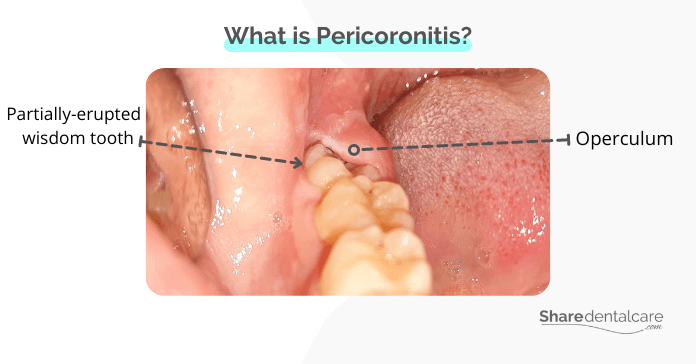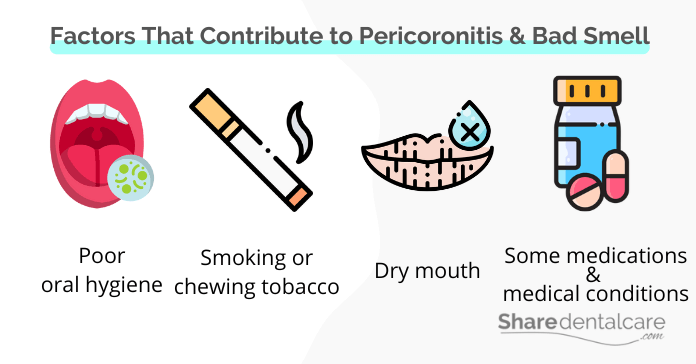Bad breath is a common symptom of pericoronitis. It can cause embarrassing social situations and may be a sign of other dental problems. The cause of the bad smell is usually the buildup of bacteria in the mouth. This can happen when food is caught in the teeth or on the gums. The bacteria release toxins that cause an unpleasant odor. In this blog post, We will discuss why pericoronitis causes a bad smell and what you can do about it.
What is Pericoronitis?
Pericoronitis is an inflammation of the gum tissue flap (operculum) covering a partially erupted or impacted wisdom tooth. The most common symptom of pericoronitis is pain and tenderness in the affected area. Other symptoms may include:
- Swelling of the gum tissue around the tooth
- Painful gums around the wisdom tooth
- Redness of the gum tissue
- Bad breath
- Unpleasant taste in the mouth
- The discharge of pus (pericoronal abscess)
- Difficulty opening the mouth

Why Pericoronitis May Cause Bad Smell?
Pericoronitis usually occurs when food particles and bacteria become trapped in the gum tissue around a partially erupted or impacted tooth. Pericoronitis bacteria produce sulfur compounds, which are responsible for the bad smell. The trapped food also starts to decompose and can add to the bad smell. In addition, pericoronitis may also cause an abscess (a collection of pus) to form. The abscess can also contribute to the bad odor.
Other Factors That May Contribute to Pericoronitis & Bad Smell
Several factors can contribute to the development of both pericoronitis and bad smell, including:
- Poor oral hygiene: If you do not brush and floss regularly, the food particles and bacteria will build up in your mouth and increase your risk of pericoronitis and bad smell.
- Smoking: Smoking tobacco products can increase your risk of pericoronitis because it dries out the mouth and decrease your body’s ability to fight infection. Besides, chemicals in tobacco mix with saliva and cause bad breath. You can read more about how smoking can cause periodontal disease.
- Dry mouth: Saliva helps to keep your mouth clean and free of bacteria. If you have a dry mouth (xerostomia), there is less saliva to wash away the food particles and bacteria, which can lead to pericoronitis and a bad smell.
- Digestive system problems: An imbalance of bacteria in your digestive system can negatively affect your oral health, contributing to pericoronitis and bad breath.
- Hormonal changes: Hormonal changes, such as during puberty or pregnancy, can make you more susceptible to gum disease and pericoronitis, which can lead to unpleasant smells.
- Some medications: Some medications can cause dry mouth as a side effect, which can lead to pericoronitis. Besides, dry mouth can also cause bad breath.
- Medical conditions: Some medical conditions, such as diabetes, can make you more susceptible to pericoronitis. Fruity-smelling breath can be a symptom of uncontrolled diabetes.

Treatment of Both Pericoronitis and Bad Smell
Good oral hygiene is the most important measure in preventing pericoronitis. You should brush your teeth at least twice a day and floss daily. If you are experiencing pericoronitis, you should see your dentist as soon as possible. Your dentist may recommend:
- Cleaning the affected area: Your dentist may perform professional teeth cleaning to remove the food particles and bacteria.
- Removing the gum tissue flap (operculectomy): In some cases, your dentist may need to remove the gum tissue flap (inflamed operculum) to allow access to the tooth so that it can be cleaned properly.
- Antibiotics: Your dentist may prescribe antibiotics to help clear the infection.
- Tooth extraction: If pericoronitis is severe or recurrent, your dentist may recommend extracting the wisdom tooth.
Home Remedies
In addition to professional dental treatment, several home remedies may help relieve the symptoms of pericoronitis and the bad smell, including:
- Practicing good oral hygiene: Good oral hygiene is the best way to prevent pericoronitis and bad breath. You should brush your teeth at least twice a day and floss daily to remove food particles and bacteria.
- Using an antibacterial mouthwash: Mouthwashes can help to kill the bacteria that cause pericoronitis and the bad smell. Antibacterial mouthwashes are recommended for only short-term use because they can kill both good and bad bacteria in your mouth.
- Pain relief: Your dentist may recommend over-the-counter pain medications to help relieve the pain and tenderness associated with pericoronitis.
- Drink plenty of water: Drinking plenty of water can help to keep your mouth hydrated and wash away food particles and bacteria.
You can read more about pericoronitis home remedies.
Pericoronitis Smell – Conclusion
Pericoronitis usually occurs when food particles and bacteria become trapped in the gum tissue around a partially erupted or impacted tooth. These bacteria produce sulfur compounds, causing bad breath. If you have pericoronitis, it is important to see your dentist as soon as possible. In addition to professional dental treatment, good oral hygiene is the best way to prevent pericoronitis and the bad smell associated with it.